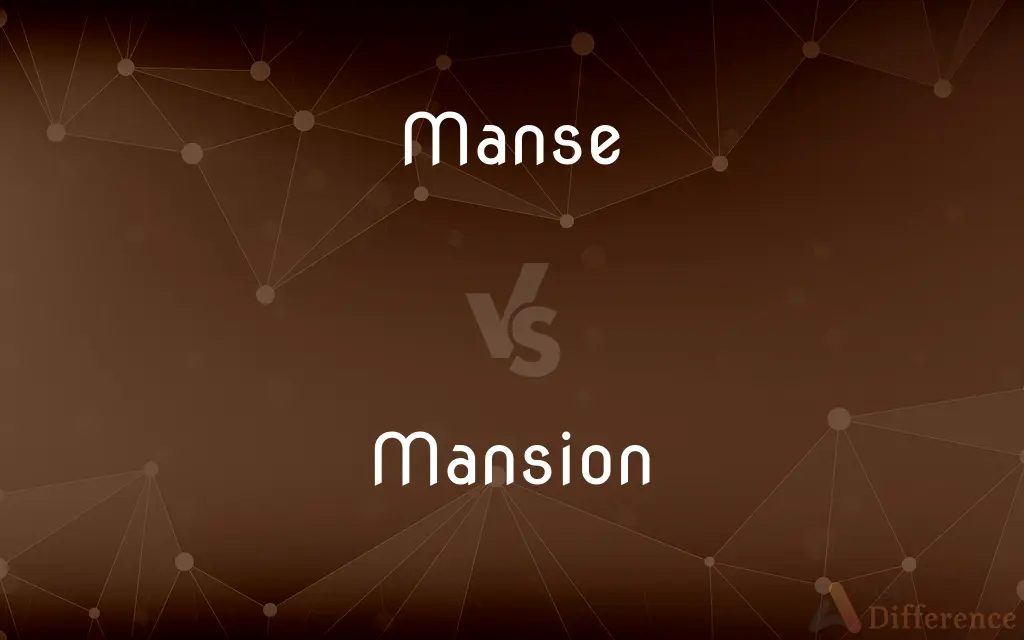Manse vs. Mansion — What's the Difference?
By Tayyaba Rehman & Maham Liaqat — Updated on March 30, 2024
A manse traditionally refers to a clergy house, while a mansion is a large, impressive residence.

Difference Between Manse and Mansion
Table of Contents
ADVERTISEMENT
Key Differences
A manse is historically associated with the dwelling of a minister in many Christian denominations, typically located near the church it serves. In contrast, a mansion is defined by its large size and luxurious features, often symbolizing wealth and status.
While the term manse carries a specific ecclesiastical connotation and implies functionality over luxury, a mansion emphasizes opulence, spaciousness, and architectural grandeur, irrespective of any religious affiliations.
Manses are often modest in size and design, reflecting the community-oriented role of the clergy, focusing on utility and accessibility. On the other hand, mansions are designed to impress, with elaborate designs, extensive grounds, and luxurious amenities.
The cultural significance of a manse lies in its role within the religious and local community, serving as a home and a hub for church activities. Meanwhile, a mansion is often viewed as a symbol of personal achievement and social status, detached from community or religious functions.
In terms of architecture and history, manses adhere to a more restrained aesthetic, suitable for their role in religious communities. Mansions, however, are architectural feats, showcasing the pinnacle of design and luxury of their times.
ADVERTISEMENT
Comparison Chart
Definition
A clergy house, often near a church.
A large and impressive residence.
Associated With
Clergy and religious communities.
Wealth, status, and luxury.
Size and Design
Modest and functional.
Large, opulent, and elaborately designed.
Cultural Significance
Serves religious and community roles.
Symbolizes personal achievement and status.
Architectural Features
Restrained and suitable for community activities.
Elaborate designs and luxurious amenities.
Compare with Definitions
Manse
Acts as a hub for church-related activities.
The manse’s garden was often used for community gatherings.
Mansion
A large, luxurious residence, often a symbol of wealth and prestige.
Their new mansion overlooks the bay and features a private dock.
Manse
Modest in size and design, focusing on utility.
Despite its age, the manse was well-maintained and inviting.
Mansion
Often showcases unique or grand architectural designs.
The mansion was a marvel of modern architecture, with sweeping lines and glass walls.
Manse
Primarily functional, serving the needs of a clergy member and their family.
The manse had several rooms for hosting church meetings.
Mansion
Primarily serves as a private dwelling, without the community or religious functions of a manse.
The mansion is known for its lavish parties and exclusive guest list.
Manse
Directly associated with religious service and community.
The manse has been the home of our pastors for generations.
Mansion
Characterized by opulent features and expansive grounds.
The mansion boasted a cinema room, a gym, and an outdoor pool.
Manse
A residence provided for a minister in Christian denominations.
The new pastor moved into the manse adjacent to the church.
Mansion
Represents social status and financial success.
Owning a mansion in that neighborhood is a sign of significant wealth.
Manse
A manse () is a clergy house inhabited by, or formerly inhabited by, a minister, usually used in the context of Presbyterian, Methodist, Baptist and other Christian traditions. Ultimately derived from the Latin mansus, "dwelling", from manere, "to remain", by the 16th century the term meant both a dwelling and, in ecclesiastical contexts, the amount of land needed to support a single family.Many notable Scots have been called "sons (or daughters) of the manse", and the term is a recurring point of reference within Scottish media and culture.
Mansion
A mansion is a large dwelling house. The word itself derives through Old French from the Latin word mansio "dwelling", an abstract noun derived from the verb manere "to dwell".
Manse
A cleric's house and land, especially the residence of a Presbyterian minister.
Mansion
A large, impressive house.
Manse
A large stately residence
"In a huff, the senator retreated to his manse in Butte—three stories, thirty-four rooms, stuffed with Tiffany glass lamps" (Timothy Egan).
Mansion
A large stately house.
Manse
(transitive) To excommunicate; curse.
Mansion
A manor house.
Manse
A house inhabited by the minister of a parish.
Mansion
A dwelling; an abode.
Manse
(archaic) A family dwelling, an owner-occupied house.
Mansion
A separate dwelling in a large house or structure.
Manse
A large house, a mansion.
Mansion
See house.
Manse
A dwelling house, generally with land attached.
Mansion
Any one of the 28 divisions of the moon's monthly path.
Manse
The parsonage; a clergyman's house.
Mansion
A large house or building, usually built for the wealthy.
Manse
A large and imposing house
Mansion
(UK) A luxurious flat (apartment).
Manse
The residence of a clergyman (especially a Presbyterian clergyman)
Mansion
An apartment building.
Mansion
(obsolete) A house provided for a clergyman; a manse.
Mansion
(obsolete) A stopping-place during a journey; a stage.
Mansion
(historical) An astrological house; a station of the moon.
Mansion
(Chinese astronomy) One of twenty-eight sections of the sky.
Mansion
An individual habitation or apartment within a large house or group of buildings. (Now chiefly in allusion to John 14:2.)
Mansion
Any of the branches of the Rastafari movement.
Mansion
A dwelling place, - whether a part or whole of a house or other shelter.
In my Father's house are many mansions.
These poets near our princes sleep,And in one grave their mansions keep.
Mansion
The house of the lord of a manor; a manor house; hence: Any house of considerable size or pretension.
Mansion
A twelfth part of the heavens; a house. See 1st House, 8.
Mansion
The place in the heavens occupied each day by the moon in its monthly revolution.
The eight and twenty mansionsThat longen to the moon.
Mansion
To dwell; to reside.
Mansion
(astrology) one of 12 equal areas into which the zodiac is divided
Mansion
A large and imposing house
Common Curiosities
What distinguishes a manse from a mansion?
A manse is a clergy house often associated with a church, focusing on functionality, while a mansion is a large, luxurious residence symbolizing wealth.
Can a manse be considered a mansion if it’s large and luxurious?
While a manse might have substantial size or certain luxuries, its primary role and ecclesiastical association typically distinguish it from a mansion.
Are all mansions modern in design?
No, mansions vary widely in design, from historical and traditional to modern and contemporary styles.
How important is location for a mansion?
Location is often crucial for mansions, with many situated in prestigious or exclusive areas, enhancing their status and value.
Is the term "manse" used exclusively in Christian contexts?
Primarily, yes, the term "manse" is rooted in Christian traditions, although its use can extend metaphorically or in broader cultural references.
What features are commonly found in mansions?
Mansions may include features like swimming pools, home theaters, extensive gardens, and other luxury amenities.
Is the architecture of a manse significant?
While more functional than flamboyant, the architecture of a manse can still hold historical or cultural significance.
What is the role of a manse in a religious community?
The manse serves as a residence for ministers, facilitating their pastoral duties and enabling closer community engagement.
How has the concept of a mansion evolved over time?
While the core concept of luxury and status remains, the design and features of mansions have evolved to reflect contemporary tastes and technologies.
Can anyone live in a manse?
Typically, manses are reserved for clergy and their families as part of their service to the church and community.
Do mansions always indicate wealth?
Generally, yes, owning a mansion is commonly associated with financial success and high social status.
How do manses contribute to community life?
Manses often serve as centers for church activities, meetings, and hospitality, reinforcing community bonds.
Do mansions play a role in cultural or historical contexts?
Yes, many mansions are important culturally or historically, representing architectural trends or the legacy of their occupants.
Can the design of a manse reflect the community it serves?
Yes, the design of a manse often takes into account the needs and character of the community, aiming to be a welcoming and functional space.
How does the maintenance of a mansion compare to that of a manse?
Maintaining a mansion often requires significant resources due to its size and luxury features, while a manse's upkeep is usually more modest.
Share Your Discovery

Previous Comparison
Communication vs. Discussion
Next Comparison
Inquiry vs. RequestAuthor Spotlight
Written by
Tayyaba RehmanTayyaba Rehman is a distinguished writer, currently serving as a primary contributor to askdifference.com. As a researcher in semantics and etymology, Tayyaba's passion for the complexity of languages and their distinctions has found a perfect home on the platform. Tayyaba delves into the intricacies of language, distinguishing between commonly confused words and phrases, thereby providing clarity for readers worldwide.
Co-written by
Maham Liaqat













































